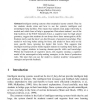Free Online Productivity Tools
i2Speak
i2Symbol
i2OCR
iTex2Img
iWeb2Print
iWeb2Shot
i2Type
iPdf2Split
iPdf2Merge
i2Bopomofo
i2Arabic
i2Style
i2Image
i2PDF
iLatex2Rtf
Sci2ools
112
click to vote
ITS
2000
Springer
2000
Springer
Limitations of Student Control: Do Students Know When They Need Help?
Intelligent tutoring systems often emphasize learner control: They let the students decide when and how to use the system's intelligent and unintelligent help facilities. This means that students must judge when help is needed and which form of help is appropriate. Data about students' use of the help facilities of the PACT Geometry Tutor, a cognitive tutor for high school geometry, suggest that students do not always have these metacognitive skills. Students rarely used the tutor's on-line Glossary of geometry knowledge. They tended to wait long before asking for hints, and tended to focus only on the most specific hints, ignoring the higher hint levels. This suggests that intelligent tutoring systems should support students in learning these skills, just as they support students in learning domain-specific skills and knowledge. Within the framework of cognitive tutors, this requires creating a cognitive model of the metacognitive help-seeking strategies, in the form of...
Related Content
| Added | 25 Aug 2010 |
| Updated | 25 Aug 2010 |
| Type | Conference |
| Year | 2000 |
| Where | ITS |
| Authors | Vincent Aleven, Kenneth R. Koedinger |
Comments (0)

